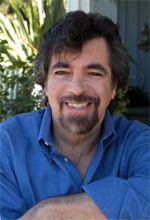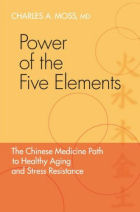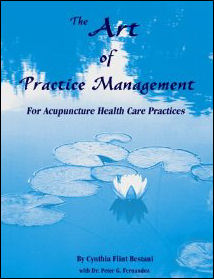Acupuncture & TCM Articles

Neil R. Gumenick is the founder and Director of The Institute of Classical Five-Element Acupuncture. Neil is a Worsley certified advanced teacher of Classical Five-Element Acupuncture and a practitioner with over 27 years of private practice experience. Neil holds three degrees from the College of Traditional Acupuncture (U.K.), and he participated for 10 years in the Master Apprentice Programô, led by Profs. J.R. & J.B. Worsley. Neil has taught at the USC and UCLA Schools of Medicine, the Worsley Institute of Classical Acupuncture, the Traditional Acupuncture Foundation, California Acupuncture College, Santa Barbara College of Oriental Medicine, and Pacific College of Oriental Medicine. He has been a Professor at Emperor's College of Traditional Oriental Medicine and SAMRA University of Oriental Medicine. Neil is co-author of The Art of Practice Management for Acupuncture Health Care Practices
Using the Spirits of the Points: The Small Intestine Meridian Part One
By Neil Gumenick, MAc (UK), LAc, Dipl. Ac
The Small Intestine Official, belonging to the element Fire, is known as the Separator of the Pure from the Impure. His job is likened to an internal alchemist who puts everything through an ordeal by fire, sorting what is good and pure from what is gross and impure.
Being the brother to the Supreme Controller (the Heart Official), it is his responsibility to ensure that only that which is good, pure, and worthy of consideration gets through to the Heart.
The Chinese considered the Officials to be much more than physical entities. They saw them as ministers of the royal court - each with a unique gift and job to do in service to the kingdom. The king was supreme in the sense that he was the wisest, fairest, most unselfish and most loving, uniquely qualified to lead. To lead with love means to live fearlessly in the moment. Being king, however, did not mean that he was the toughest in the kingdom. The king, therefore, relied upon ministers whose jobs included protecting him from the insults, complaints, and negativity that are so often hurled at a leader when things get challenging. If the king had to fear for his own safety, he could not be fair, impartial, and dispense his love and wisdom freely.
 
The Sorter of the Pure from Impure affords the king a layer of protection from the rabble, the mundane, and the impure, so he can lead from a place of purity. Ultimately, purity and love are one and the same. Love is the fruition or crowning of the human experience, just as in the summer (the season of the Fire Element), we see the fruition of the entire growing cycle: the flowers in full bloom, fruit on the trees - life at its fullest expansion.
Just as the Small Intestine sorts and separates pure from impure for the Supreme Controller, so it does also for every other Official. For example, the Gall Bladder, the Official of decision-making and judgment, would do a very poor job if he only had garbage from which to choose. How could we make a clear and insightful decision if we were only faced with bad choices?
The Three Levels
Similarly, the Small Intestine sorts on every level. Physically, it extracts the essence of nourishment from the food we eat. If this Official is malfunctioning, even if we eat a "pure" diet, we may discard the good in the food and retain the bad, as no food is wholly good or wholly bad. On the other hand, if our Sorter is healthy, even if we periodically ingest "junk food," we will be able to absorb nearly all of the small amount of "good" in the junk and discard the rest. This is something to consider when evaluating a patient's (or our own) diet. While what we eat is important, what happens to what we eat is also vitally important.
Mentally, consider the vast amount of input that assails our minds daily: the images of war, crime, brutality, aggression, greed, hatred, and all manner of negativity. If we absorbed all of the above without the capacity to separate it out and discard it, we would become that negativity, with our minds utterly polluted and identified with it.
Deeper still and more tragic is when the negativity reaches our spirit. We may lose the inability to distinguish between good and evil. We may lose the will to go on. Life just seems too dark, negative, and toxic to carry on. We are unable to reach the essence of love and joy within ourselves or anyone else. We feel, "What's the use? It's all a bunch of crap anyway. Why bother?" Yet, when the Small Intestine Official is healthy, we have the power to recognize, separate, and retain the goodness - even from the nastiest of environments - to cast aside the rubbish left by nature, as well as by the sickness and imbalance of others.
Diagnosis of "Causative Factor"
Using points on the Small Intestine for their spiritual connotation will only be effective when it has been determined that the patient's primary imbalance resides within the Fire element, and specifically that the affected Officials are on the Small Intestine and/or Heart side of Fire. In Classical Five-Element Acupuncture, we consider the two sides of the Fire Element as if they were two separate elements. Hence, a patient who is a Fire Causative Factor will either be primarily imbalanced on the Heart and Small Intestine side of Fire, or the Circulation/Sex (a.k.a., Pericardium) and Three Heater side. We determine this by listening to the patient's Officials, which will tell us which side of the element is most challenged and in need of help.
In any case, the determination of the Causative Factor as Fire must first be made, and is determined by methods of classical diagnosis of color, sound, emotion, and odor, not by symptoms, what the patient says, or how he or she feels. Regardless of which side of Fire is affected, there will be an excess or lack of red in certain areas of the face, an excess or lack of laughter, an excess or lack of joy, and a scorched odor emitted. These are the four pillars of diagnosis that point to the underlying imbalance.
Being in balance means that we are in harmony with ourselves and with our environment. Imbalance means that we are, to some degree, out of such harmony. This will manifest in inappropriate expressions of color, sound, emotion, and odor, which we can identify in our patients, if our senses are awake. The excesses or lack refer to expressions that are present when they should not be, or strangely absent when they should. For example, a patient's voice may have an almost continual laughing sound, even though there is nothing particularly funny going on. Contrarily, in a context that should normally bring forth joy, none is forthcoming.
The Interdependency of the Officials
The Elements and Officials are connected like members of an intimate family. Any part can and will be affected by any other part. Thus, any Element or Official can be the cause of the kind of toxicity I have described above. A primary imbalance in any Official, within a space of time, is bound to upset the functioning in the Small Intestine and the Separator may, for this reason, show a myriad of secondary distress signals. To treat the Small Intestine would be inappropriate and ineffective in such cases and would only, at best, be palliative, leaving the real cause of the disease undisturbed, and allowing it to become sicker as time passes.
In part two of this article, we will discuss the spirits of specific points on the Small Intestine meridian and their uses.

Small Intestine Meridian (SI)
The Hand Greater Yang (Tai Yang) of the Small Intestine 19 points
The small intestine channel of the Hand-Taiyang starts at the ulnar aspect of the tip of the little finger, and travels along the ulnar border of the hand dorsum upward to the posterior border of the lateral aspect of the upper arm . It passes through the cubital region curving around the scapular region. Then turning downward to the supraclavicular fossa and ascends to the neck. Travels up to the cheek going through the outer canthus of the eye, and ends anterior to the tragus of the ear.
View Small Intestine Point Locations.
 
The Art of Practice Management for Acupuncture Health Care Practices
What you will find in this book is a specific, comprehensive approach that gets to the root cause of success in practice.
This new book presents acupuncture practice as art from the standpoint of centering, qi, and wholeness. It builds on the premise that practices succeed from bridging inner and outer aspects of the self. It is an inquiry into the self and addresses clear understandings and approaches to reputable patient care and practice qi. It brings in the five elements and work with the seasons of practice from training and start-up to growth, stability, expansion and transformation. The authors artfully bridges the essence of both patient and practitioner well-being without excluding the practicalities of financial well-being. This book very specifically and extensively shows how the different parts of practice nourish and feed one another and are interdependent on one another for the qi to flow synchronistically.
It explores the dual nature of procedures that work and those which do not in acupuncture health care practice, returning again and again to the delicate balance of practicality and spirituality.
|
